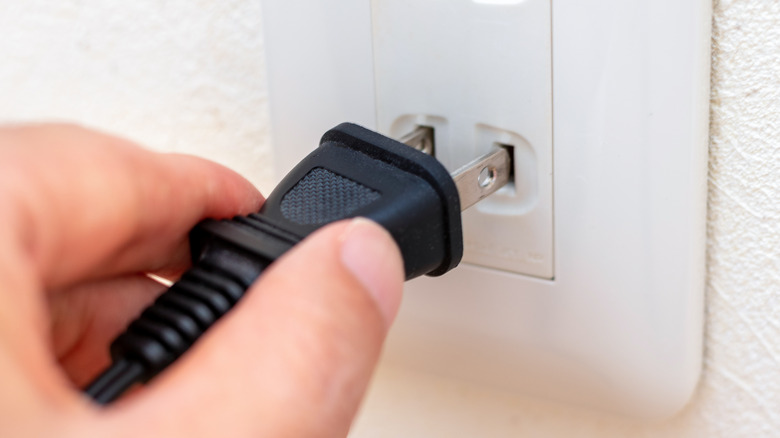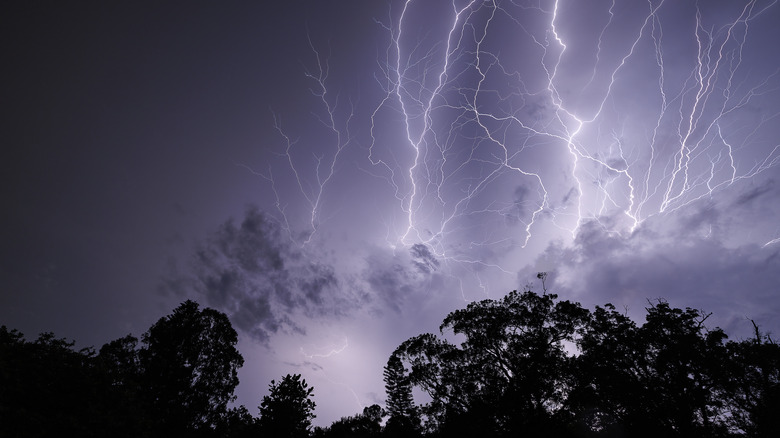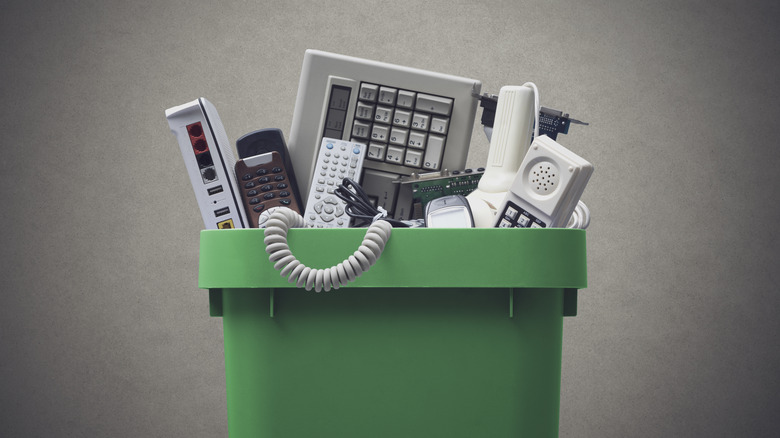Do You Need To Unplug Electronics During A Thunderstorm?
In this technological era, electronics have become deeply ingrained in everyday life. From work to leisure time, such tech is practically unavoidable in much of the world. While many of our devices and gadgets these days are battery-powered, many still utilize wall power to perform their functions. At this point, there are even several different kinds of electrical plugs to be aware of, and the wisest ways in which to use them. Ironically, sometimes the smartest and safest way to use a wall outlet and a device that needs it is to simply not bring them together in the first place.
There are some situations where, despite their relatively safe nature, outlets are better off left unoccupied for the time being. One such instance is a thunderstorm, where it's a good idea for your safety and the longevity of your devices that they're unplugged until the storm subsides. This is because of the possibility of a lightning strike impacting your home's electrical system, which can lead to a sudden power surge. For devices not equipped with a surge protector, this sudden increase in power can lead to damage or even a complete shutdown. Not to mention, your home's electrical setup is likely to sustain damage along the way as well.
No matter how you look at it, unplugging electronics during a thunderstorm is in your best interest. Simultaneously, there are major steps you can take to keep your entire house safe from a lightning strike.
Methods of making your home as lightning-resistant as possible
As effective as it is, unplugging electronics during a thunderstorm is just one aspect of home and electronic lightning protection. There are other helpful steps to take to keep your home as safe as possible from sudden nature-induced jolts. For one, there's the installation of a whole-house surge protector, which attaches to your home's electrical panel and protects against sudden power surges. Unfortunately, it should be said that these are both expensive and not a surefire solution to every lightning strike. If it hits your house directly, it's not going to do much to protect your electrical system.
Alternatively, to divert lightning away from your home and the power lines connected to it, you could invest in a lightning rod. As their name suggests, these are metal rods intended to attract lightning strikes, safely guiding them to the ground and away from power lines, electrical boxes, and similar structures. Much like whole-house surge protectors, though, lightning rods can get expensive to install, so be mindful of that before trying one. More lightning technology is being developed to save lives, so hopefully, all issues pertaining to this force of nature will be addressed in the future.
Sadly, if you haven't taken any of the necessary steps to prepare for a lightning strike, there's a chance your electronics could've been impacted by one. There are several ways to determine if this is the case and to respond if such an incident were to occur.
How to tell if electronics were ruined by lightning and what to do with them
Though it might not be apparent at first glance, there are a few ways to tell if your electronics have been ruined in some way by a lightning strike. The matter of performance is one of the most obvious, as a power surge is likely to negatively impact how a device works — assuming it's capable of working at all — in the aftermath. Before you can even test out your device safely following a power surge, some physical signs of damage are likely to arise. A burning smell from the area is possible, burn marks or discoloration at the outlet can present themselves, and other forms of physical damage to your devices could be visible.
With one or more electronics damaged, what should you do next? As far as outlets, contacting a trusted professional electrician is the way to go; this way, you can address any wiring issues and have outlets replaced if needed. As for your devices, if they're damaged and can be taken in for repairs, you can certainly bring them in to hopefully be restored if something is seriously wrong. Consulting any manuals and checking warranties are good ideas if you're hoping for repairs or, if possible, replacements from the manufacturer. If not, disposing of them responsibly is also an option. There is a way to dispose of old electronics properly, so make sure if you go this route, you're following the law.
It's no guarantee that lightning will harm your home during a thunderstorm, but it's better to be safe than sorry. Even if you have taken precautions to prevent lightning damage, unplugging your electronics when a storm begins is a wise move.


